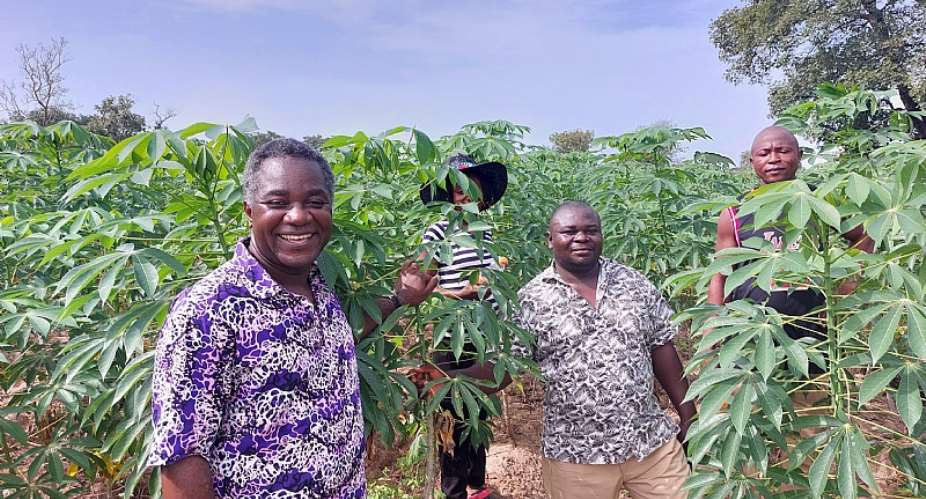Cassava farmers in Benue State are excited over the positive outlook of their cassava fields as they anticipate high yields this harvest season; and hundreds among them taking up the business of selling improved seeds in local communities.
Typically, yields in Nigeria are less than nine tons per hectare but improved varieties grown by Cassava Seed Entrepreneurs (CSEs) offer 20 tons and above, according to Sasakawa Africa Association. Farmers across the country now aim to achieve higher yields in addition to selling stems for additional income and sustainably facilitate the diffusion of varieties throughout the country.
“We planted the TME 419 variety and the performance has been awesome,” said farmer Vitalis Iorlaha. “The fact that we can sell the stems and make money from roots and stems gives me a lot of joy. Honestly, this project is a life changer.”
The Building an Economically Sustainable Integrated Cassava Seed System (BASICS-II) project is using a systems approach to offer farmers access to clean, disease-free, and high-yielding planting materials. Central to BASICS-II, which is led by the International Institute of Tropical Agriculture (IITA), is the establishment of CSEs that are linked to early generation seed producers which are in turn connected to breeder seed producers.
In this framework, Sasakawa Africa Association (SAA) is incubating CSEs that are generating income and creating employment from the sales of cassava stems in Benue and Nasarawa states. The project has successfully helped 10 cooperative societies to establish more than 50 hectares of cassava seed fields across various local governments in the two states with more fields planned for the 2024 season.
According to the Country Director for SAA-Nigeria, Dr Godwin Atser, who recently visited one of the seed fields, the cassava seed entrepreneurs will form the foundation of a cassava revolution in North Central Nigeria. “They will be the source of quality cassava planting materials of improved varieties for farmers in the region and beyond”, he said.
An elated farmer in the community, Mrs Dorathy Amile, said in an interview that apart from exposing farmers to improved cassava varieties, Sasakawa, through the project, supported them with training and inputs that eased cultivation.





 Don't travel to volatile regions in northern Mali — Ministry of Foreign Affair t...
Don't travel to volatile regions in northern Mali — Ministry of Foreign Affair t...
 ILO’s claim of depleting reserves false, we have funds to pay pensions — SSNIT
ILO’s claim of depleting reserves false, we have funds to pay pensions — SSNIT
 Benin police fire tear gas to break up union protest
Benin police fire tear gas to break up union protest
 Lay KPMG audit report on SML-GRA contract before Parliament – Isaac Adongo tells...
Lay KPMG audit report on SML-GRA contract before Parliament – Isaac Adongo tells...
 Supervisor remanded for stabbing businessman with broken bottle and screwdriver
Supervisor remanded for stabbing businessman with broken bottle and screwdriver
 People no longer place value in public basic schools; new uniforms, painting wil...
People no longer place value in public basic schools; new uniforms, painting wil...
 'Comedian' Paul Adom Otchere needs help – Sulemana Braimah
'Comedian' Paul Adom Otchere needs help – Sulemana Braimah
 Ejisu by-election: Only 33% of voters can be swayed by inducement — Global InfoA...
Ejisu by-election: Only 33% of voters can be swayed by inducement — Global InfoA...
 Minority will expose the beneficial owners of SML, recover funds paid to company...
Minority will expose the beneficial owners of SML, recover funds paid to company...
 Prof. Opoku-Agyemang has ‘decapitated’ the NPP’s strategies; don’t take them ser...
Prof. Opoku-Agyemang has ‘decapitated’ the NPP’s strategies; don’t take them ser...
